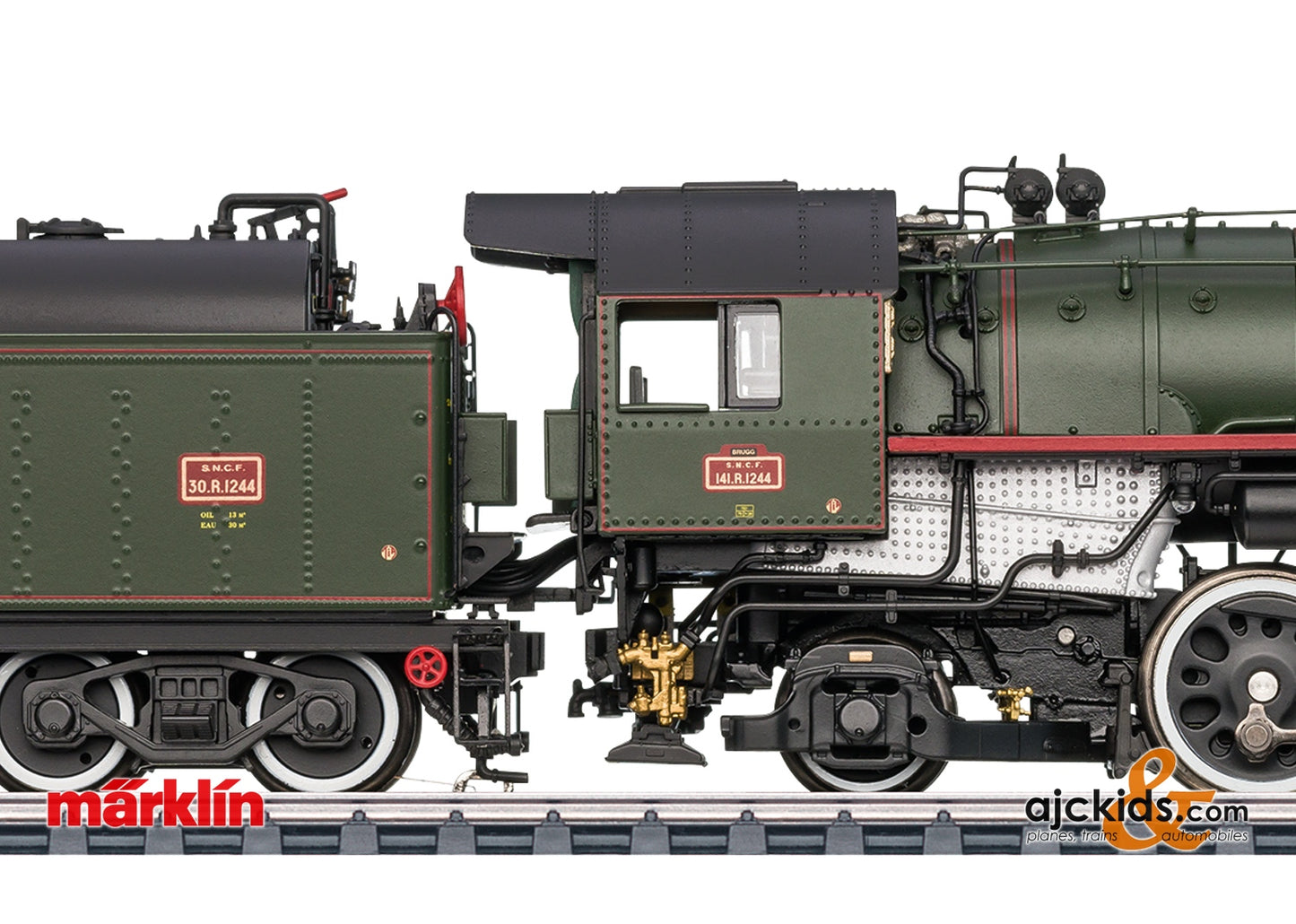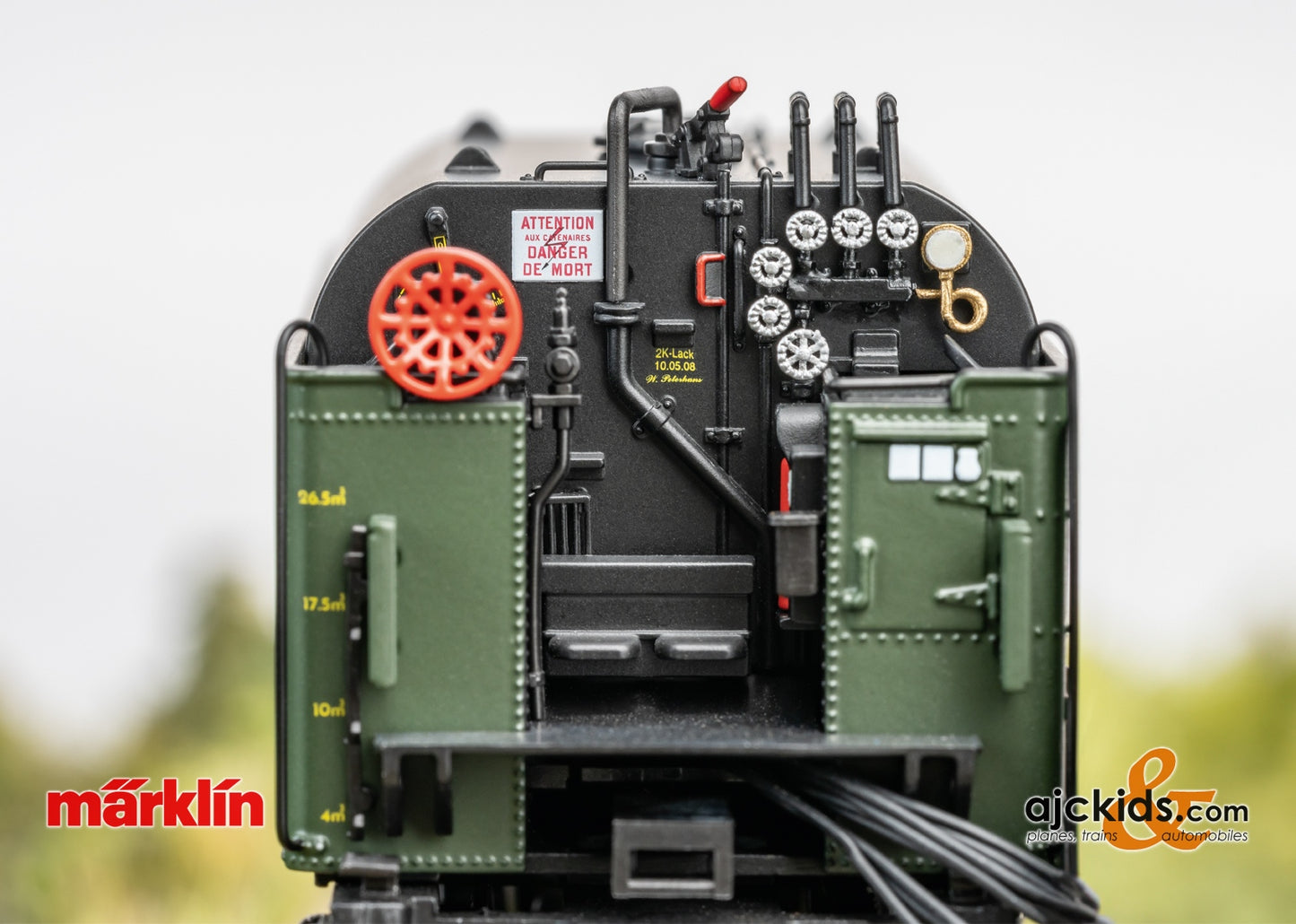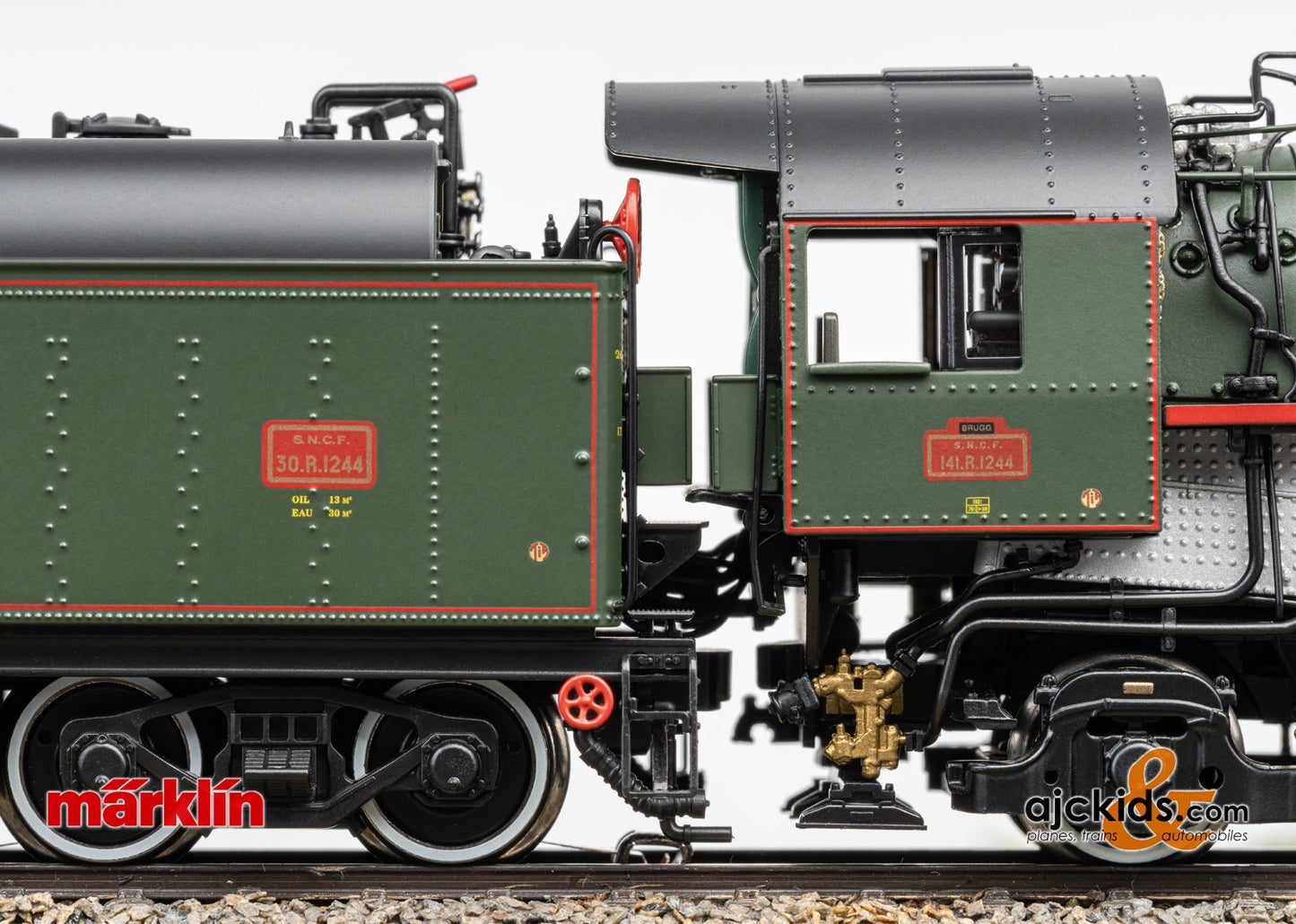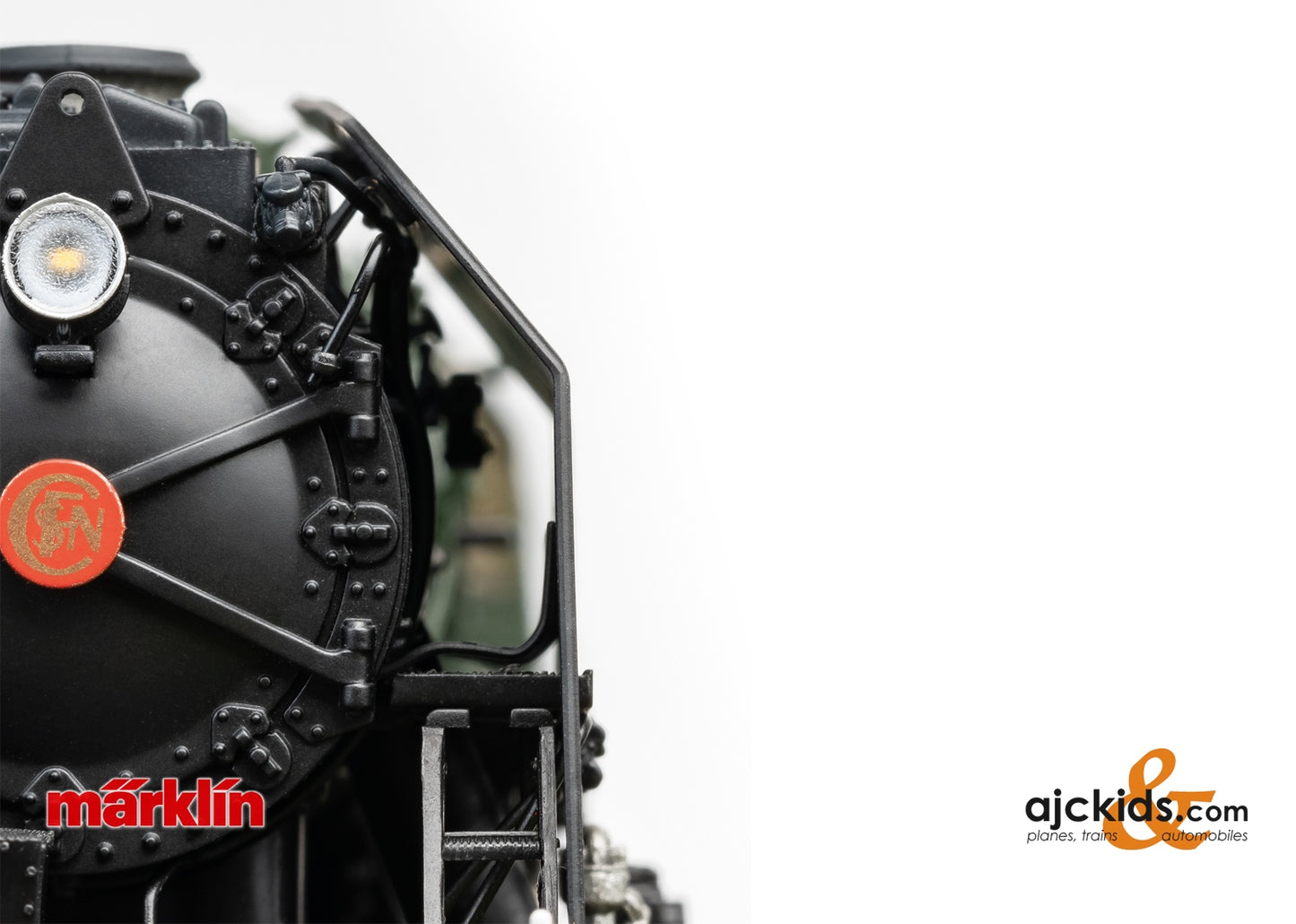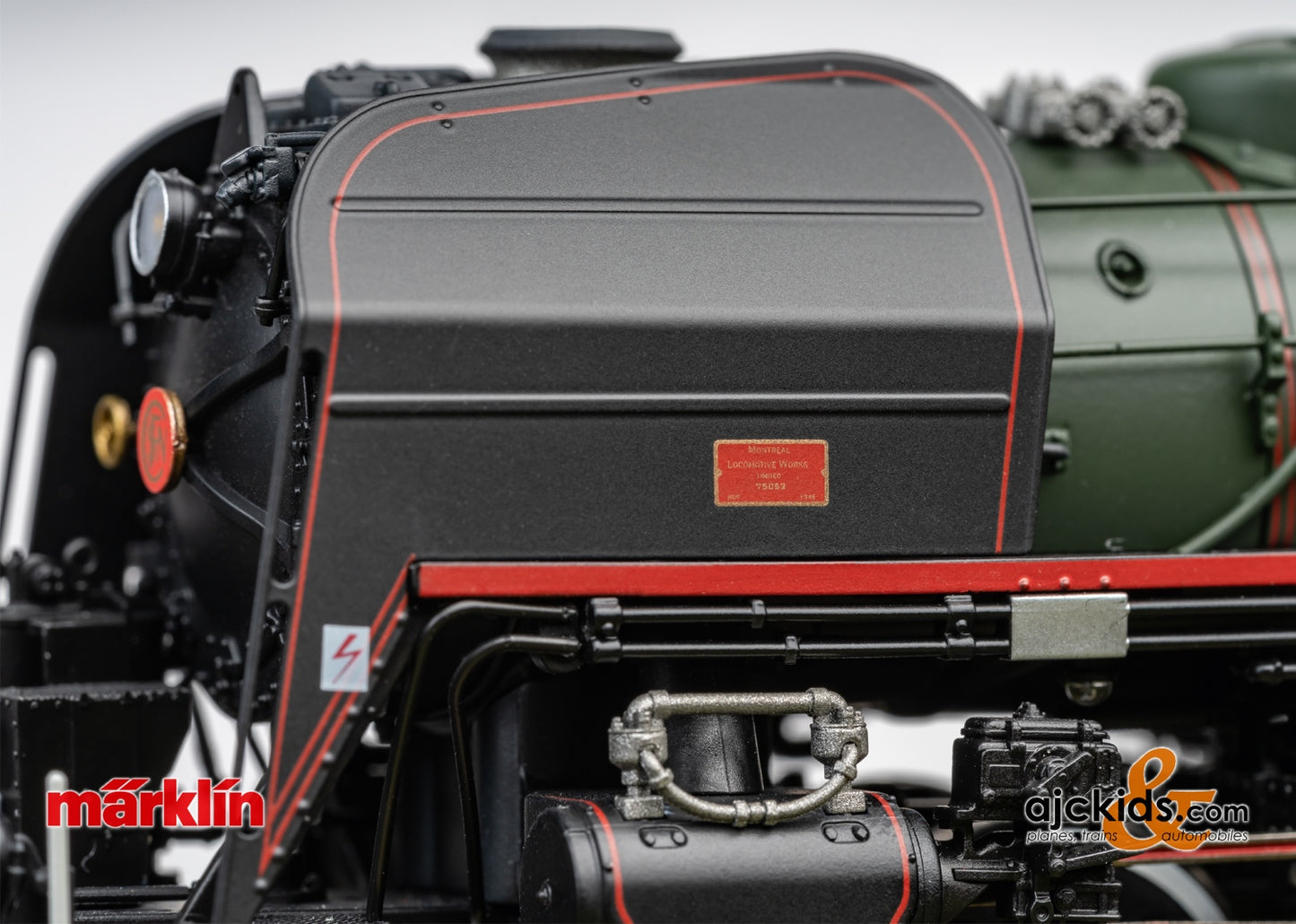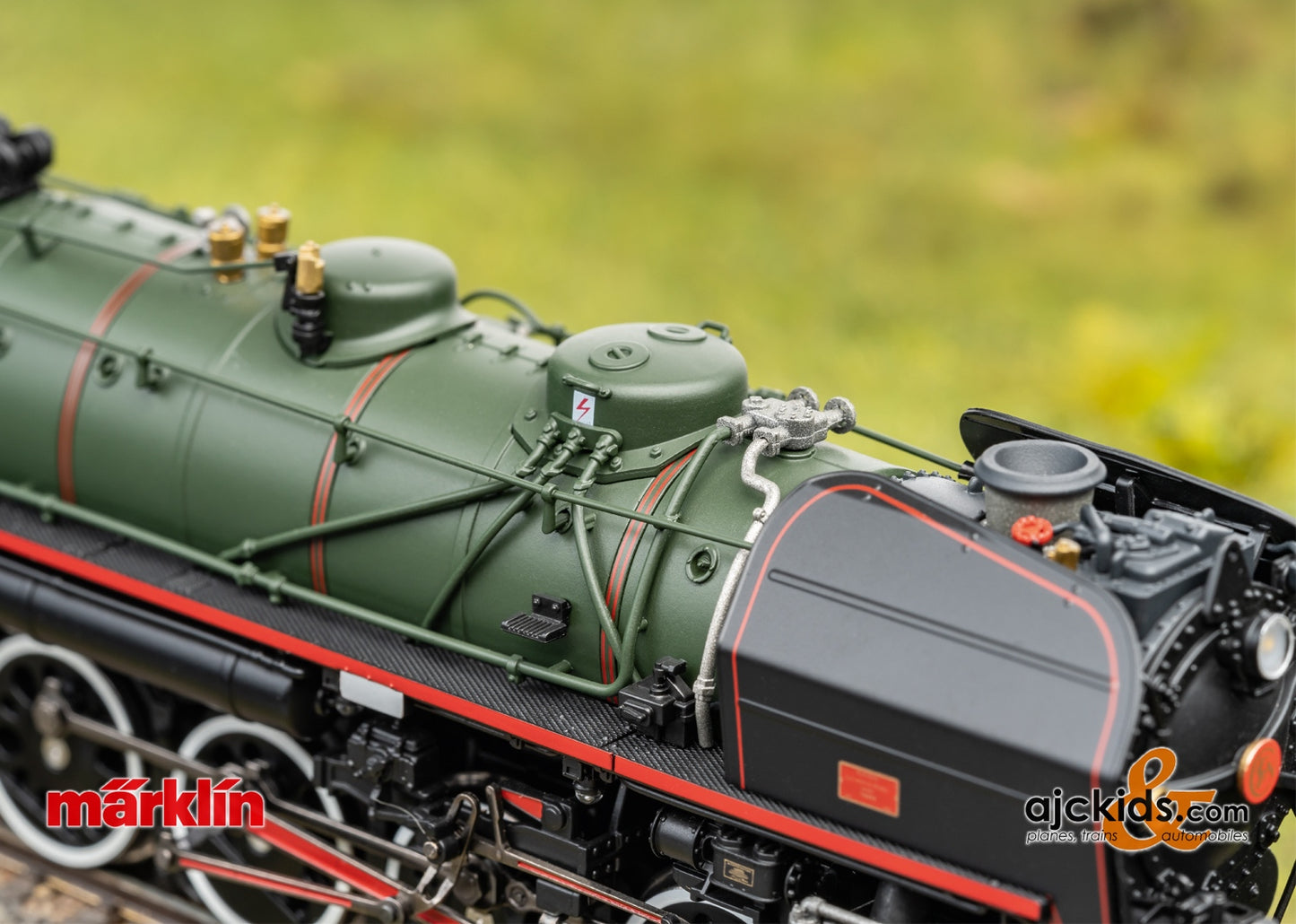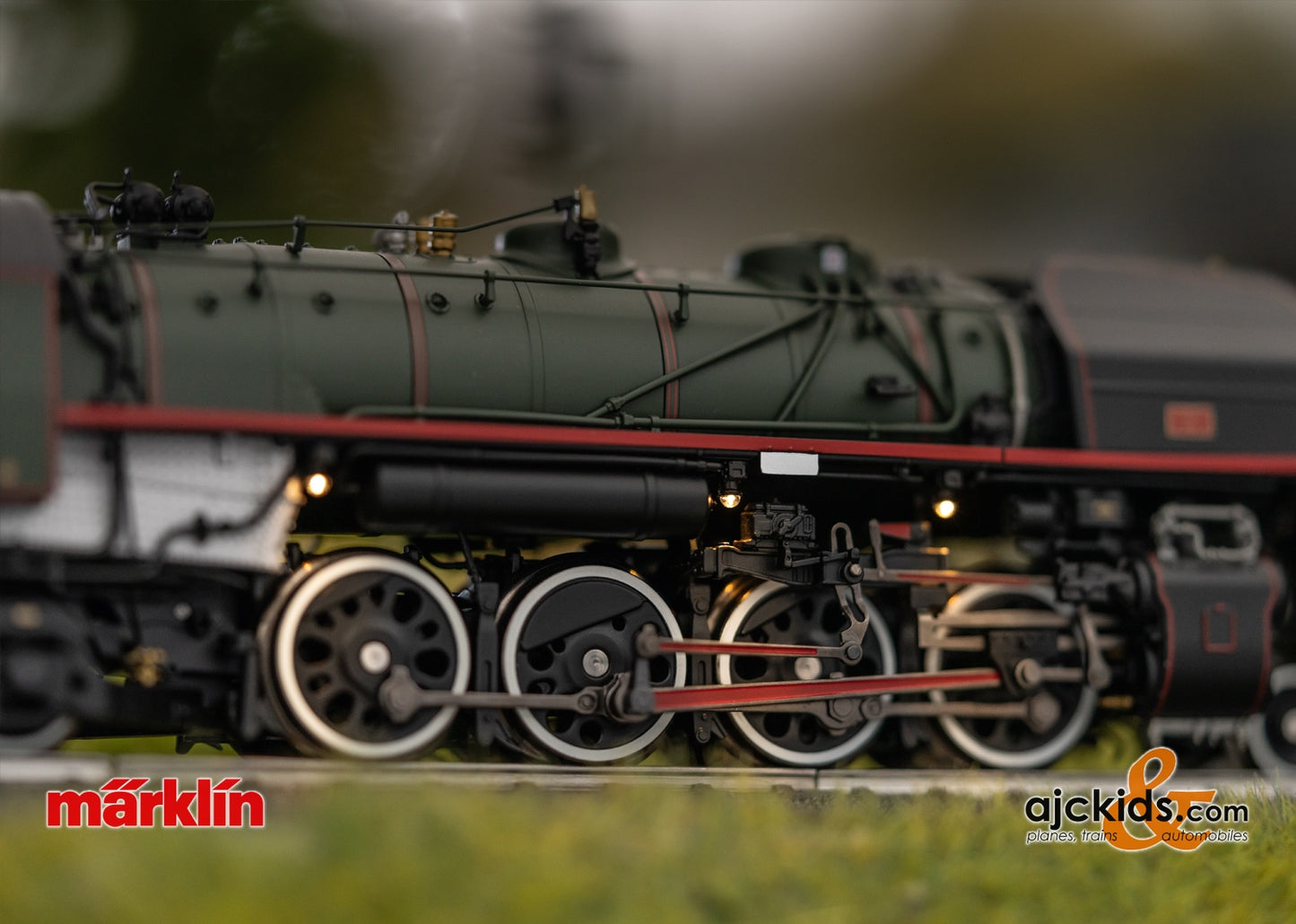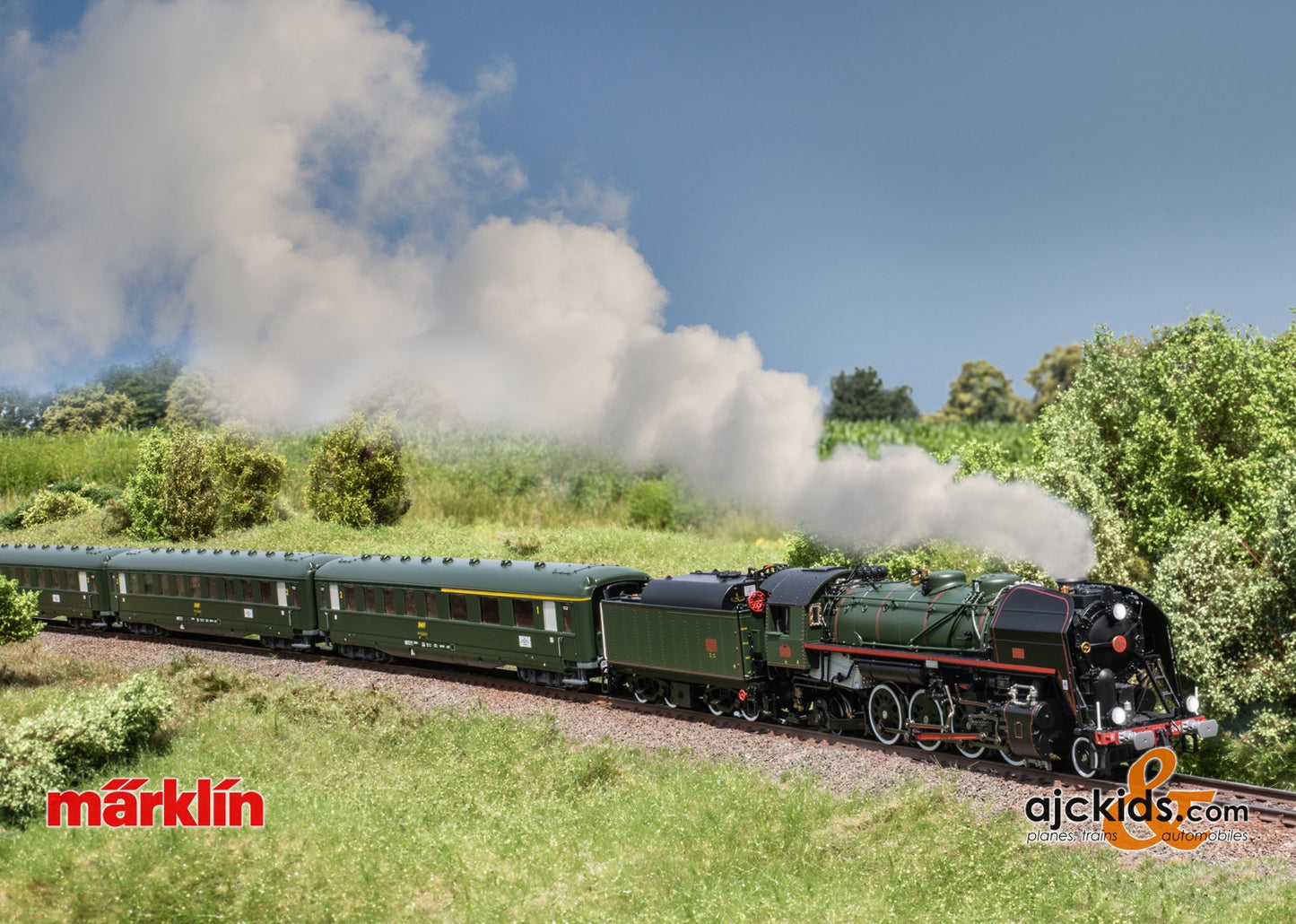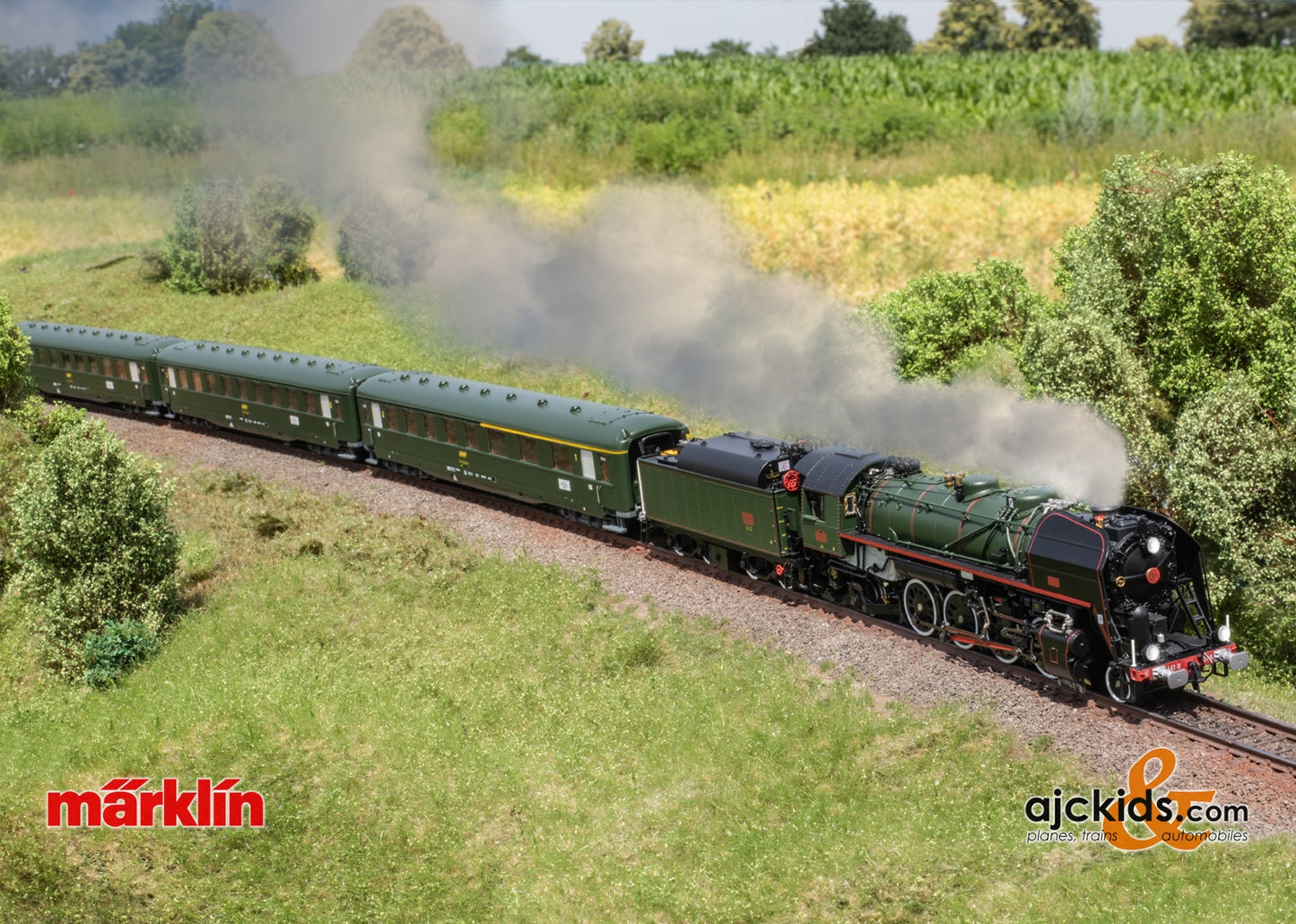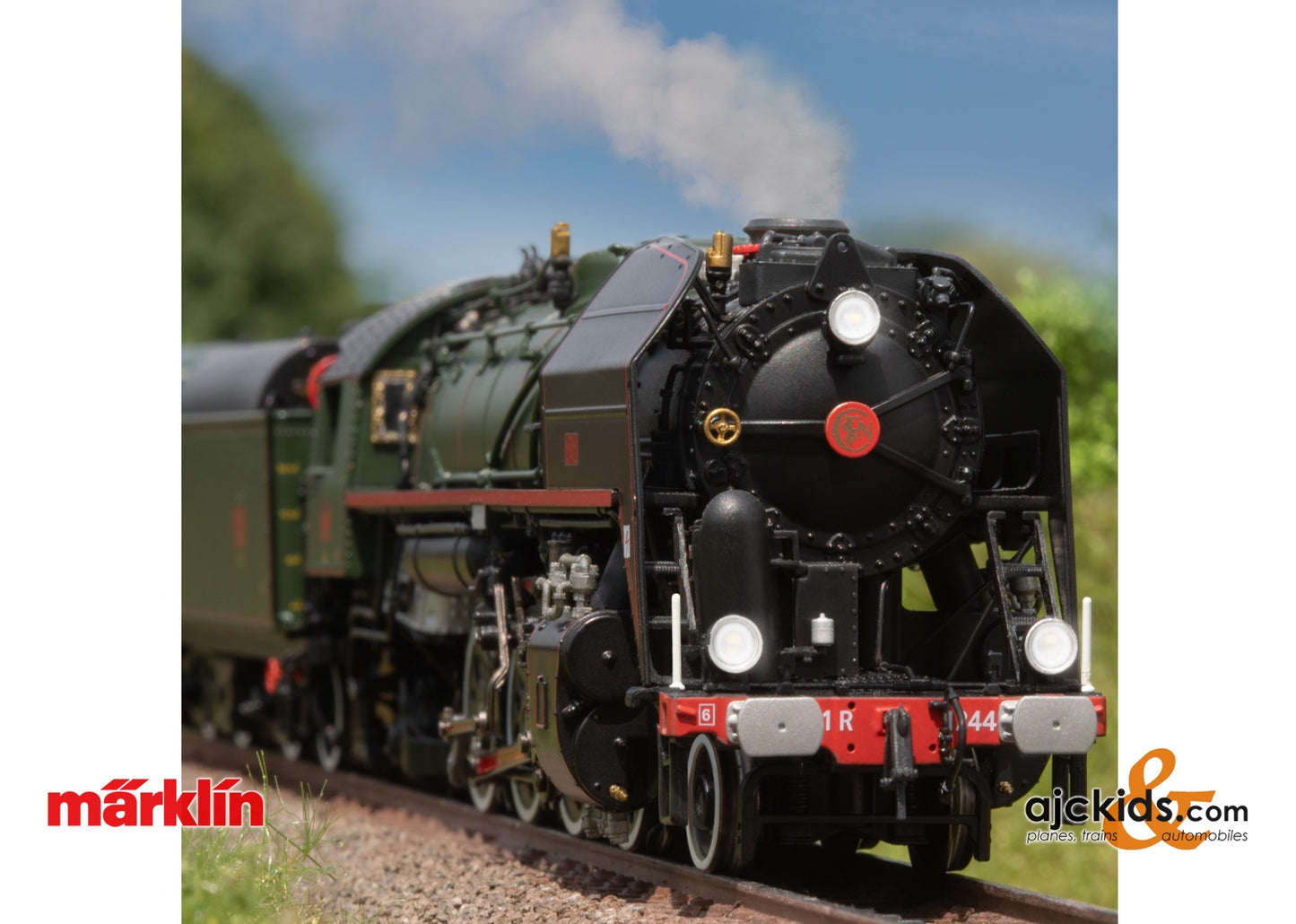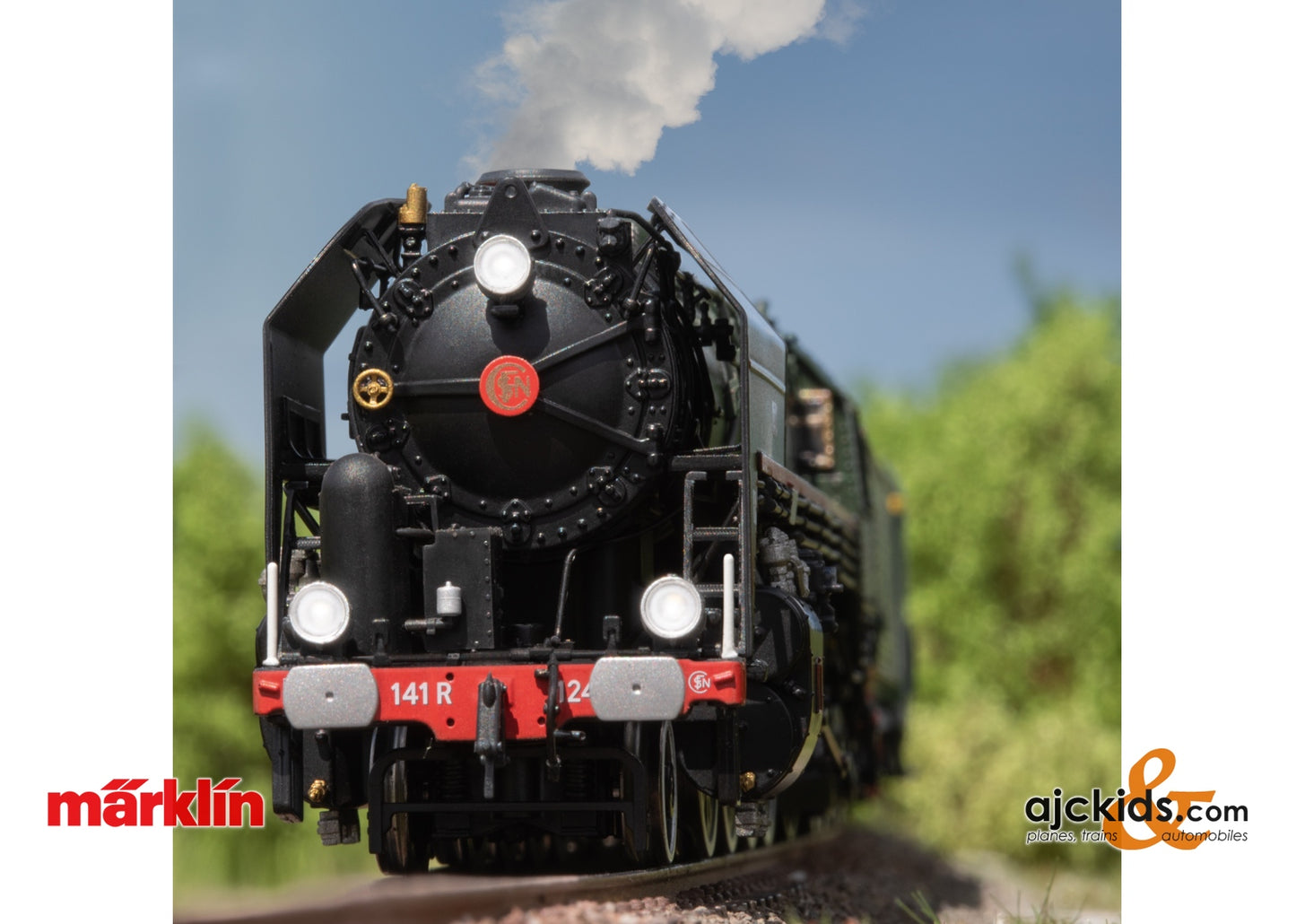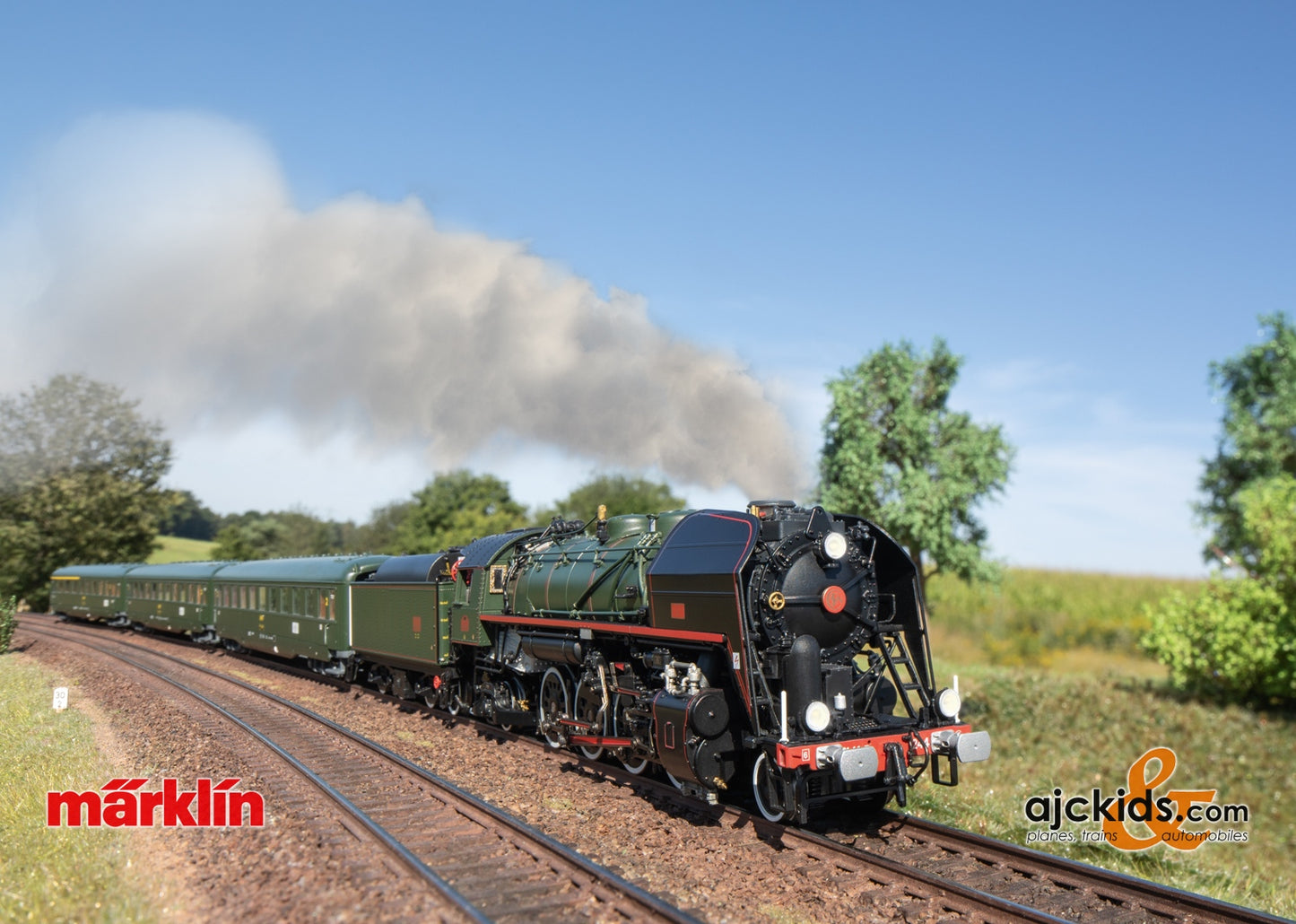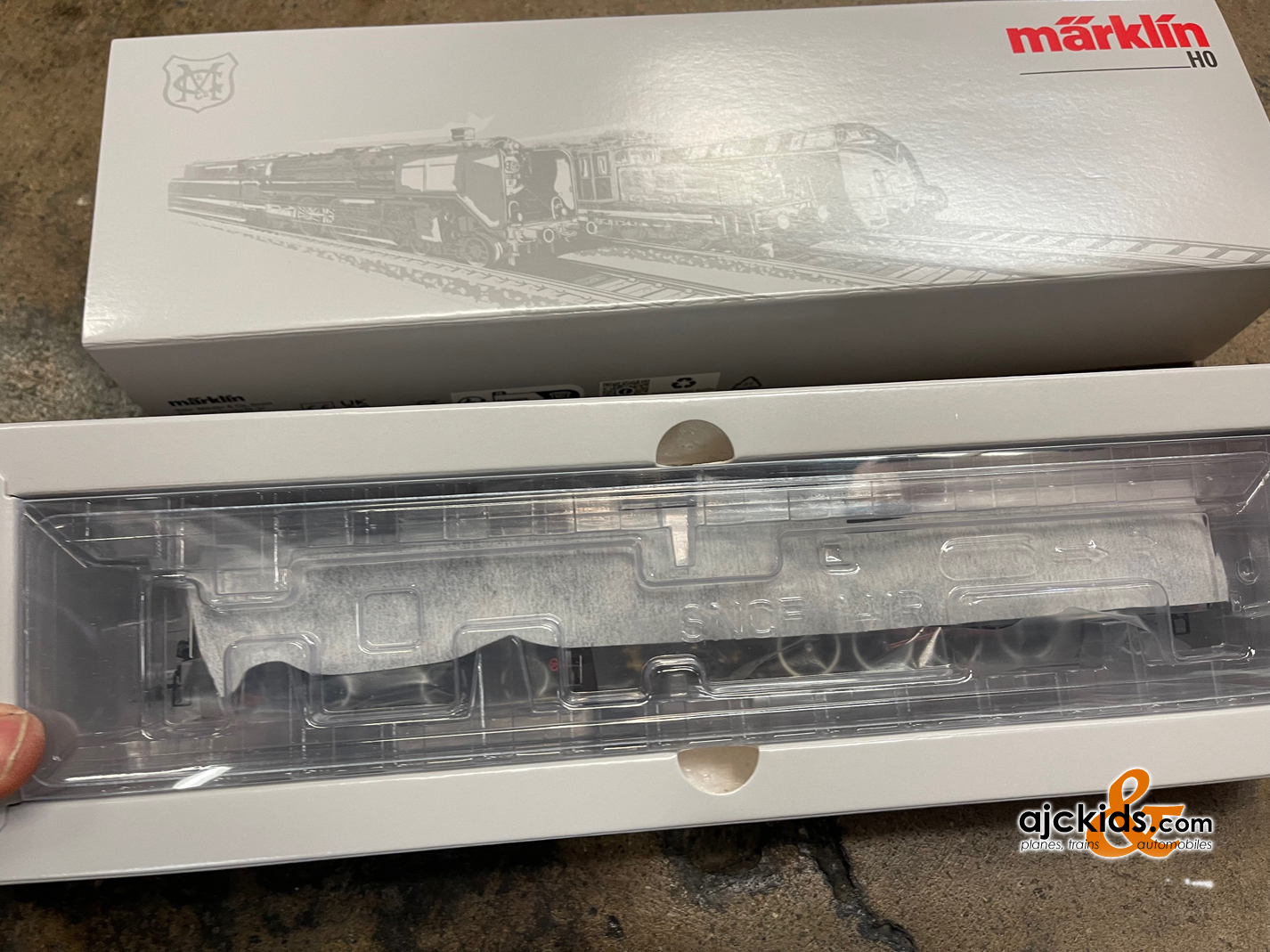Marklin 38141 - Class 141.R. Steam Locomotive. Road Number 1244
Prototype: Class 141.R steam locomotive with an oil tender. Road number 1244 for mixed service, as it looked on the French State Railways (SNCF). The locomotive looks as it currently does in operational condition based at the Verein Mikado 1244 / Mikado Association 1244 in Brugg in Switzerland.
Highlights
- Completely new tooling.
- Class 141.R. in the Märklin program for the first time.
- Especially intricate metal construction.
- A variety of separately applied details.
- Factory-installed smoke generator.
- Cab lighting, running gear lights, and firebox / burner flickering controlled separately in digital operation.
- World of Operation mfx+ digital decoder with extensive light and sound functions.
- Buffer height adheres to the NEM.
Product description
Model: The locomotive has an mfx+ digital decoder and extensive sound functions. It also has controlled high-efficiency propulsion with a flywheel, mounted in the boiler. Four axles powered, three of them using side rods. Traction tires. The locomotive and tender are constructed mostly of metal. There is a factory-installed smoke generator. The headlights and dual red marker lights change over with the direction of travel, will work in conventional operation, and can be controlled digitally. These lights can be switched to a red marker light. The cab lighting, running gear lights, and firebox / burner flickering can be controlled separately in digital operation. Maintenance-free warm white and red LEDs are used for the lighting.
There is a close coupling with a mechanism between the locomotive and the tender. The tender has a close coupler with a guide mechanism in an NEM pocket. The buffer height on the locomotive and tender adheres to the NEM.
The minimum radius for operation is 360 mm / 14-3/16".
Piston rod sleeves and brake hoses are included.
Length over the buffers approximately 27.9 cm / 11".
Charlie's Tips
A car set to go with this locomotive can be found in the Märklin H0 assortment at Ajckids under item number Marklin 43230. This model can be found in a DC version in the Trix H0 assortment under item number 25141.
Publications
- Special Imprint and Special Products
Prototype information
We are writing in 1944 and Europe lay in rubble. The French exile government was therefore already giving thought about how the country could be quickly rebuilt. A great deal of importance was attributed to the railroad. However, the French locomotive roster had been massively decimated, and the locomotive builders were not in a position to fill the gaps in the short term. The railroad therefore turned to the USA and placed orders there for the construction of general-purpose Mikado locomotives. These units had to be extremely powerful, rugged, easy to maintain, as well as fast and affordable to build. The famous Baldwin Locomotive Works then developed the famous unit adhering to the French norms on the basis of the "Light Mikados" widely used in the USA. The designation Mikado did not refer to the Japanese play of the same name. The USA is not the only place to designate steam locomotives with a single axle pilot truck and a single axle trailing truck as well as eight driving wheels or four powered axles.
A first production run of 700 locomotives was ordered as early as February of 1945, when France had been liberated for the most part. In order to be able to deliver the units as quickly as possible, the order was divided up among the three large USA locomotive builders Baldwin, Lima, and the Big Boy builder ALCO, which only needed barely one year for the production.
The second run of 640 units reached France by September of 1947, whereby two Canadian locomotive builders now took part in the construction.
The SNCF State Railways designated their new locomotive stars according to their numbering system as the class 141 R. The number stands for the aforementioned axle arrangement, the R for the date of the first delivery. The first production run when delivered had only coal firing with a mechanical stoker for firing. The second production run had oil firing on 284 locomotives from the factory, while by 1947 another 320 units of the class 141 R were converted to oil firing. The class 141 R with its simple steam expansion and with its modern construction technique and an indexed output of over 3,000 horsepower meant a true revolution for the SNCF. It was easier to operate than the earlier French locomotive types and the servicing was less extensive and considerably less costly.
Thanks to its high level of availability, good running characteristics, and the enclosed cab, the class 141 R was among the most popular French steam locomotives. With a maximum speed of initially 90 / 56 and later 100 km/h / 63 mph, they could be used as well pulling most train types. Their domains were to be sure heavy freight and fast freight trains. However, express trains and passenger trains also belonged to the range of tasks for this overall successful American. On the Cote d’Azur between Nice and Marseille the class 141 R was motive power for a number of years for the luxury train "Mistral". Otherwise, the class 141 R units could be found in almost all regions of France.
A proud USA Mikado also had the dubious honor of providing motive power for the last commercial SNCF steam train on March 31, 1974, in Saargemünd (Sarreguemines) near the German border. Nine of these successful Mikados currently still exist, several of them even as operational old-timers, which remind people of the great era of steam motive power in France. The prototype of the class 141 R, road number 1244, has been nurtured since 1977 in Switzerland by the Mikado 1244 Association. It has oil firing and is used as motive power pulling special trains all over the country. More information about this locomotive can be found at www.mikado1244.ch.
Features
Warning
| CONTROL UNIT | MOBILE STATION | MOBILE STATION 2 | CENTRAL STATION 1/2 | CENTRAL STATION 3/2 | |
|---|---|---|---|---|---|
| Headlight(s) | X | X | X | X | X |
| Smoke generator | X | X | X | X | X |
| Steam locomotive op. sounds | X | X | X | X | X |
| Locomotive whistle | X | X | X | X | X |
| Direct control | X | X | X | X | X |
| Sound of squealing brakes off | X | X | X | X | |
| Engineer’s cab lighting | X | X | X | X | |
| Marker light(s) | X | X | X | X | |
| Running gear lights | X | X | X | X | |
| Air Pump | X | X | X | ||
| Letting off Steam | X | X | X | ||
| Water Pump | X | X | X | ||
| Operating sounds | X | X | X | ||
| Special light function | X | X | X | ||
| Whistle for switching maneuver | X | X | X | ||
| Injectors | X | ||||
| Sanding | X | ||||
| Switcher Double "A" Light | X | ||||
| Switching maneuver | X | ||||
| Generator Sounds | X | ||||
| Headlight(s) | X | ||||
| Safety Valve | X | ||||
| Sound of Couplers Engaging | X | ||||
| Sound of uncoupling | X | ||||
| Replenishing fuel | X | ||||
| Replenishing fuel | X | ||||
| Replenishing fuel | X | ||||
| Locomotive whistle | X |
EAN/UPC: 4001883381411


